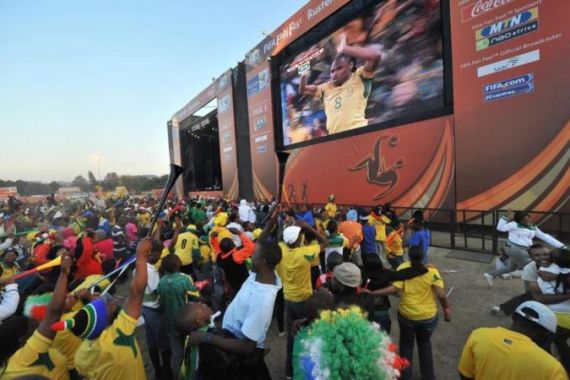Security the key in South Africa
South Africa prepare for a safe 2013 African Cup of Nations by using the same security body used for the 2010 World Cup.

South Africa will have the same centralised security body it used for the World Cup at next year’s African Cup of Nations as government and tournament organisers said they had learned lessons from the strikes that marred part of football’s showpiece tournament two years ago.
In a joint statement Tuesday, the South African government and local organising committee said the National Joint Intelligence and Operations Structure would again oversee security at the African Cup in January and February.
Keep reading
list of 4 itemsMan Utd win FA Cup semifinal thriller against Coventry on penalties
Manchester City vs Chelsea 1-0: FA Cup semifinal – as it happened
Brazil football legend Romario announces comeback at 58
South Africa’s generally good organisation of the World Cup in 2010 was undermined when privately-hired stadium stewards went on strike over wages and were dispersed by police using tear gas, forcing the government to take over security at five of the 10 stadiums.
General labour unrest in South Africa has also left dozens dead this year, magnifying concerns over possible disruption at the Cup of Nations.
Although there has been no direct threat to the event from the violent protests, the continental championship could become a target for a currently restive workforce unhappy at low wages – as happened at the World Cup.
24-hour security
Mvuzo Mbebe, the chief executive of the local organising committee, on Friday said he ‘guaranteed’ the African Cup would be safe.
“Natjoints and the LOC are also taking measures to address some of the lessons learnt from the 2010 FIFA World Cup,” the government and organisers said.
“This includes dealing with the strikes and the intrusion in dressing rooms at Cape Town Stadium.”
|
“Natjoints and the LOC are also taking measures to address some of the lessons learnt from the 2010 FIFA World Cup” Chief exec of LOC Mvuzo Mbebe |
South Africa’s security arrangements at the World Cup also came under scrutiny when a man managed to get into the England team’s dressing room following its game against Algeria in Cape Town.
In a more recent embarrassment for South African organisers, two youths – aged just 12 and 13 – threw rocks at the team bus of African champion Zambia as it left Johannesburg’s Soccer City stadium this month following a friendly against South Africa.
Two players were hurt, with Zambia’s South African-based goalkeeper, Kennedy Mweene, needing stitches in his head.
As a result, teams would have 24-hour security at the African Cup, deputy police minister Makhotso Sotyu said, as well as escorts wherever they went.
Previously lax security arrangements at the African Cup were tightened after the Togo team bus was attacked by armed rebels in the Angolan enclave of Cabinda just before the 2010 tournament and two team officials were killed.
Togo withdrew from that competition and will play in South Africa next year in its first African Cup since the deadly gun attack.